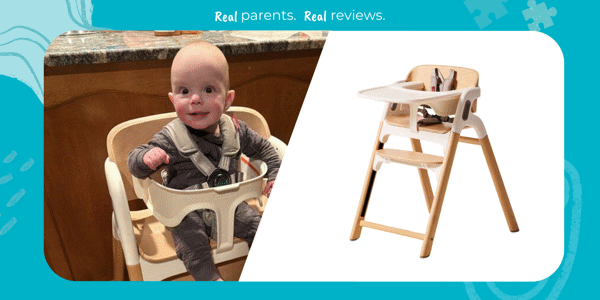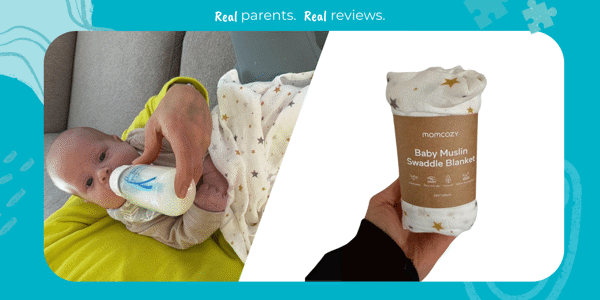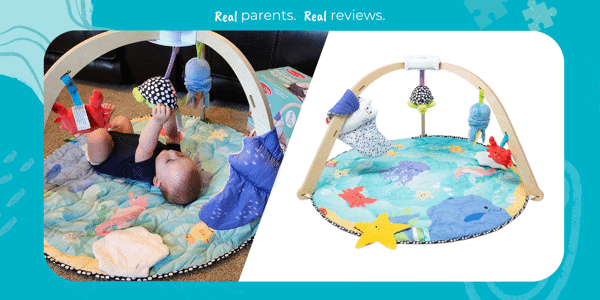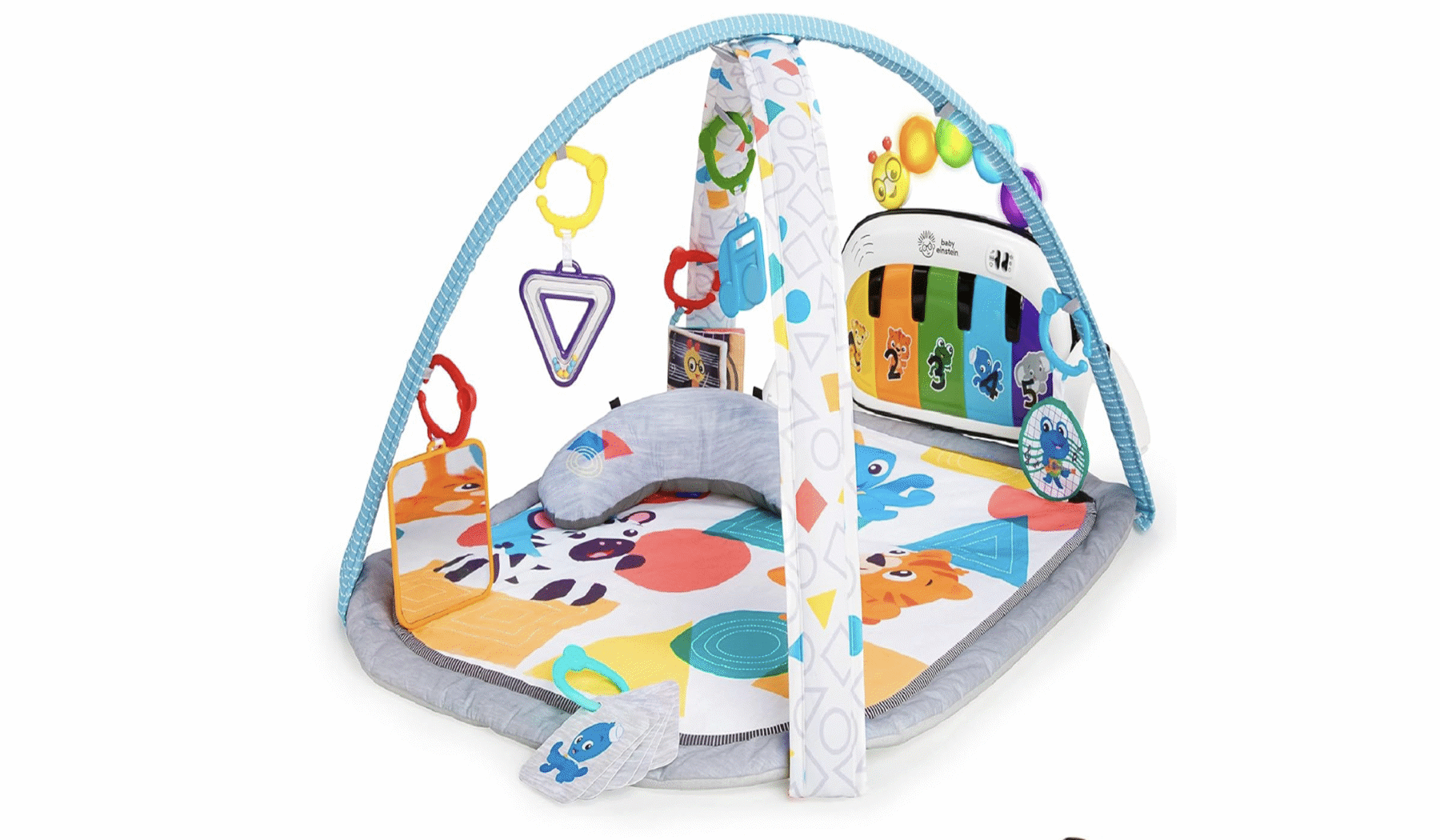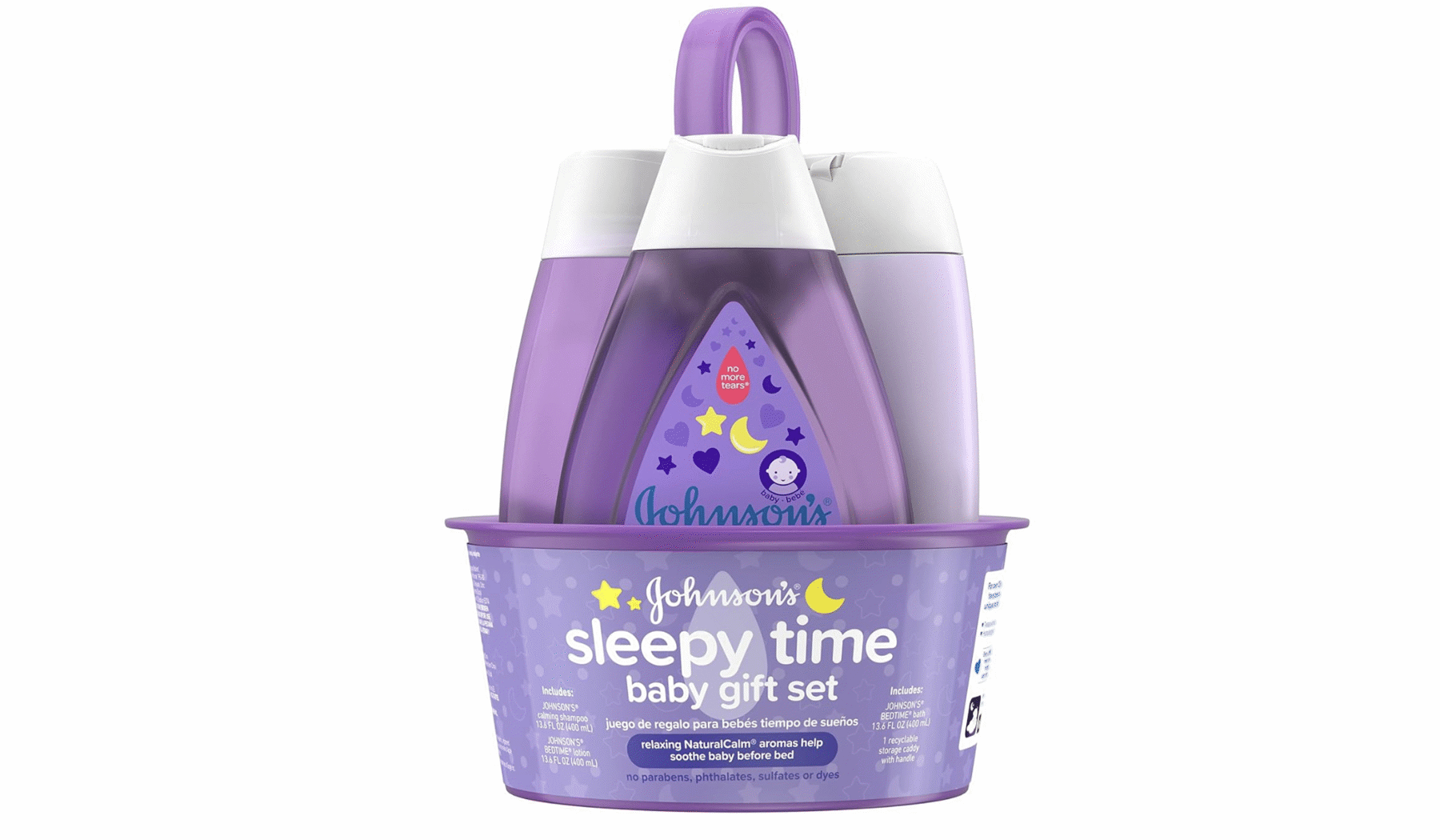2-Month-Old
This week, your baby is looking and listening. They can now differentiate people's voices and may even look around to find the source of the sounds they hear. You may notice your baby watching your mouth as you speak. While they begin communicating with coos, you can communicate back with your facial expressions! Your baby will likely navigate toward visually stimulating objects this week. To help your baby continue their development, keep colorful toys and objects with textures around. Sharp contrasting colors are sure to grab their attention!
At your baby's two-month checkup, you can discuss any questions or concerns with their pediatrician. Your doctor will guide and advise you if you have worries regarding his sleeping, eating, or overall development. At this appointment, your baby's weight, length, and head circumference will be recorded by a nurse.
Your baby is now eligible for many vaccines that protect him against various things. Your baby may receive the pneumococcal, DTaP, Hib, Polio, rotavirus, and hepatitis B vaccines. Since each vaccine prevents something different, it is normal to have questions. Your doctor will answer your concerns and explain the importance of each of these vaccinations.
Your baby's growth is still fueled by the all-liquid diet you chose for them. Whether your baby consumes formula or breast milk, they will take four to six ounces every three to four hours. Those who are breastfeeding can expect to do so around ten times each day. It is important to start watching for your baby's hunger cues, such as sucking on his hands and lips or reaching for your breast.
Moderate acid reflux and regurgitation after some feedings are regular in about 50 percent of babies daily. If your baby spits up several times throughout the day or in large amounts, they may have GERD or gastroesophageal reflux disease. Discuss the severity of your baby's reflux with their pediatrician. You may be advised to switch to a soy-based or hypoallergenic formula.
Other changes you can make include feeding your baby smaller amounts at a time more frequently throughout the day. This will help prevent your baby's belly from getting too full at once. Lastly, you can try elevating their head when they eat. If these changes do not help prevent your baby from experiencing reflux, their doctor may prescribe an antacid or an acid-blocking medication. As your baby’s sphincter muscles strengthen over time, this issue should disappear, and they should fully grow out of it by their first birthday.
You may notice your baby is experiencing fewer bowel movements daily. As your baby is growing, so are their bowels. Do not be alarmed if your baby is not pooping as much as you are used to. As their bowels grow, there is more room for waste! If your baby goes a day or even two without bowel movement this month, don't start to panic; they are just growing!
You made it to month two! You may still be healing emotionally and or physically, depending on the severity of your childbirth. It is okay to look and feel different. Even if you have recovered fully, your skin, hair, and body as a whole are allowed to look different than before pregnancy.
You may have experienced your first postpartum period. Although many women get their cycle back in earlier weeks, don't be alarmed if you haven't. Many women, especially those who exclusively breastfeed, may not get their regular period cycle back for upwards of a year.
If you are an exclusive breastfeeder, you may be experiencing clogged ducts and other challenges. If you face this issue, it is essential to address it early on to avoid any risk of infection. Clogged ducts occur when the milk duct does not drain properly, and pressure builds up behind it. The tissue around will become irritated, tender, and sore. A clogged duct feels like a knot in the breast and can be treated at home with warm Epsom salt baths or warm heating pads and cloths in ten- to twenty-minute intervals.
It may help to change the position in which you breastfeed into one that will better allow milk to loosen and ducts to drain, such as pointing your baby's chin towards the clogged duct. If the pain is not resolved within 24-48 hours, consider seeing a doctor to rule out anything more serious.You may be approaching your return to work, and numerous factors aid your ability to do so. This time period can be overwhelming, especially if you are searching for childcare. Deciding on a childcare facility or plan can be overwhelming and scary. Do not feel crazy for wanting all of your needs to be met. When touring a daycare, look around!
The caretakers should be playing and smiling on the floor with the other kids! Discuss any concerns or requirements you have with the caretakers, such as parenting opinions. Pay attention to if there is a television on all day or what the kids are fed throughout the day. Most importantly, trust your gut; you know what is best for your baby.
Balancing your household needs with those of your baby and partners can distract you from maintaining your physical and mental well-being. Take time for yourself in these weeks and enjoy them. Tell your healthcare provider if you experience any severe psychological or physical symptoms. Remember that it is okay for you to rest, too.
Just because your baby is sleeping does not mean you must rush to finish everything before they wake up. Caffeine can only do so much. You need to sleep (and deserve it too)!
Your baby is fascinated by you and your facial expressions at this age. You might even begin feeling like a celebrity with constant eyes on you as your baby watches your every move. Now that you have the hang of filling bottles and changing diapers, you might have more time for yourself, especially now that your baby sleeps longer. When your baby is down, you and your partner will have more time to focus on your relationship and relax together.
This week, you might have questions about your baby's excessive drooling. What is the cause of all of this spit-up? Your baby is likely grabbing whatever they can reach and putting it in their mouth. This is the stage of their life where most of their toys will be covered in their drool, even though they are not quite teething yet.
You are entering the bib stage! Although your baby is not teething yet, they make more saliva than they can swallow! You can help catch some of that drool by putting a bib on them throughout the day. Wearing a bib won't pose any safety hazards, but remove it when they are ready to sleep to avoid choking.
Your baby is continuing to explore various textures and shapes. Your baby has moved on from visual stimulation and is likely exploring objects with her mouth. Don't be concerned as long as these objects do not pose choking hazards.
Your baby's drool contains harmless bacteria. To sanitize her toys, use an eco-friendly, chemical-free cleaning solution. You can make your own solution using a one-to-one water and vinegar ratio. This is harmless to your baby, and you can even add any essential oils of your liking.
Most babies will still wake up throughout the night at week ten but should be sleeping for longer intervals, resulting in staying awake for more extended periods. For every 24 hours, your baby will spend around 10 hours awake.
Your baby's arm and neck muscles are not fully developed yet or strong enough to roll over, but they can probably roll from back to side or side to back. Giving your baby lots of tummy time will help them strengthen these muscles. Tummy time will also increase your baby's motor skills and help avoid stiff muscles.
Now that your baby is more mobile, diaper changes can become tricky. Keep an eye (and a hand) out whenever your baby is on an elevated surface.
Now that your baby is sleeping longer, take some extra time for yourself. It is easy to find yourself rushing to get household needs done before your little one wakes up, but you must find balance! Try not to overwork yourself while your baby is down. As your baby naps for longer periods, start prioritizing your rest. While caffeine can help you stay energized, it does not compensate for lost sleep.
Having too much coffee or tea throughout the day will make winding down difficult. Resting while your baby sleeps will benefit you more than overworking yourself to complete everything independently. Your body needs rest and nutrients, too! It is okay to accept help from others; try to appreciate it while it lasts!
While your baby's motor skills continue to develop, you can help them reach milestones by holding out objects for them to reach for and grab. Tummy time will help your baby strengthen their muscles and eventually learn to roll over! Even in moments of serenity when your baby seems unbothered, they may practice fine motor skills, such as moving her fingers and legs.
Let your baby reach for your face and grab your glasses; this is a milestone! Continue making silly faces at your little one to keep them entertained and full of giggles. Don't be afraid of looking silly. If you feel uncomfortable, try the following:
Your baby might enjoy it if you introduce peekaboo this week!
You and your partner are learning together. The first few weeks at home can be overwhelming. Your baby has been the main focus that you and your partner put all your energy into. You have been getting the hang of parenting for two months now and might be getting your sexual stamina back.
If you haven’t, that's normal, too, and it does not mean your relationship has a problem. Although intercourse may be how you are used to expressing your love for one another, there are other ways to do so.
Words of affirmation between you and your partner can help strengthen your relationship during difficult times. While you may find yourself and your partner arguing or frustrated by obstacles, remember to love through these challenges.
A simple solution is using laughter to ease tension. If something upsets you, express your feelings to your partner without pointing fingers or assigning blame. Discussing challenges and changes in your relationship can bring you closer!
Your little one has been adjusting to their body for over two months and is starting to get the hang of moving around. At this point, your baby's jerky movements should transition to smoother, more controlled ones. Their coordination has improved, and their arm motions are now more circular than spasms. Try exposing them to new people. Introducing them to potential caretakers will help to avoid developing stranger anxiety. Familiar faces may bring a smile to your baby's face!
If you and your partner are beginning to engage in sex again, decide on a contraceptive form and speak with your doctor if you have not.
By now, your little one will be more confident moving their limbs. They have gotten the hang of controlling small circular movements with grace. You will notice they are more confident and comfortable with their movements now. They may even attempt to push themself off the ground with their legs during tummy time. Your baby will soon start reaching their arms out to the person talking to or entertaining them this week!
Allow your baby to become comfortable around those you are close to and get to know each other's personalities. If there is a person or people you plan on having to look after them eventually, now is the time to get your baby familiar with them! Simple introductions to others will help your baby be more comfortable in situations they are not used to.
Forcing your baby to engage with an individual they are not yet comfortable with can be traumatic. Do not push your baby to do something they are not ready for, but also do not close them off to new things and people entirely. Time and familiarity will help your baby's interactions with new individuals to go smoothly. Remember that if your baby was born premature, they might not advance as fast, which is okay.
You may have gotten your menstrual cycle back already, but if you haven’t or are still breastfeeding, that does not mean you are safe from pregnancy. Since your ovulation will begin before your actual period does again, you do not know when your fertility has returned. Unless you want to have another baby very soon, start using contraception again whenever you decide to start having sex.
Your form of contraception will likely change now that you have given birth. If you used a diaphragm before pregnancy, you would likely need to be fitted for a different size now that you’ve had a baby. Suppose you know that you aren't going to be wanting another baby soon. In that case, other forms of contraception, including an IUD or a birth control implant, can prevent pregnancy for several years.
Breastfeeding mothers should opt for condoms instead of hormonal forms of birth control, such as the pill, the patch, or the ring. Condoms do not affect breast milk and are easy to remember. They also make contraception a joint responsibility among you and your partner.
A well-balanced diet is important in everyone's life and can help maintain high energy levels. Although food can keep your energy up, it is not your body’s only fuel source. Sleep is important, especially for new parents. On average, new parents get between two and three hours of sleep, less than the recommended eight hours per night. Lack of sleep can negatively impact your body and energy levels.
The restless nights will end soon as your baby begins sleeping through the night. Focus on getting enough sleep and keeping your body healthy to care for your baby.
Your baby's mobility is continuing to advance. You may need to adjust your lifestyle and habits this week to keep your baby and you safe. It is important never to hold a hot drink next to your little one. Your baby is still reaching out and grabbing things they do not know are off-limits. Scalding accidents can be avoided by following this rule. It might also be time to swap out your dangly earrings for some studs while your baby is lunging out to grab things that catch their attention. They are used to being encouraged to reach for things and do not yet understand your jewelry is not one of them. Please continue to support and encourage them as they learn what they should and should not reach for.
Let the fun begin! With mild support from you or an object they can lean against, your baby should be able to hold their head up for longer periods now. They will also likely be able to show their increasing strength during tummy time by pushing themself up about 45 degrees. Don’t laugh too hard; this will look like they are attempting baby pushups. Holding a toy out in front of their face can help encourage them to perform these “mini pushups.”
Your baby has been experimenting with hand movement and coordination for two months. Their fascination with their hands will continue in the coming weeks. If your baby begins sucking on their tiny baby hands, there is no reason to make them stop. When a baby sucks on their hands, it gives them a sense of self-comfort.
If your baby often sleeps in the same position for long periods, they may develop a flat spot on the back of their head (or wherever they lay on her head). This is a condition called positional plagiocephaly and often fixes itself. Although it is common that the flat spot will go away on its own, when it comes to your baby, it is always best to get a referral for a local craniofacial specialist or pediatric neurosurgeon!
In severe cases, your baby may require treatment. Similar to how positional plagiocephaly develops, babies who constantly lay in the same position or rub their heads against the mattress may develop a bald spot. As your baby grows, they will also grow out of old habits. The area should fill in, and the hair should grow back once they begin sleeping in new positions.
A warm bath can help anyone wind down. When trying to help your baby relax before bed, a warm bath can be soothing to them. Don't exceed between two to three baths a week just yet.
Remember that your baby's skin is sensitive, and do not use scented products even for babies. It’s also essential to keep the bath short and sweet.
While many parents use an infant bath seat, The Academy of American Pediatrics recommends using a slip-proof lining such as a clean bath towel to prevent your baby from slipping. This tactic is especially preferred when using a sink to bathe your baby. Be sure to conclude every bath session by lubricating your baby's skin with an oil, such as coconut oil or cocoa butter, or a baby lotion.You might start noticing changes in your skin this week. Eczema or uneven patches, including hyperpigmentation, can occur. If you are nursing or weaning off breastfeeding, this is likely to occur. This happens due to the changes in your hormones. Breakouts are also common at this stage of your postnatal journey. If you have issues with sleeping or breastfeeding, you may be more prone to these experiences.
Before motherhood, self-care looked different to you. Instead of relaxing in the sun, binging hours of uninterrupted television, or sipping wine with friends, you will find joy in brief moments of serenity these days. Now, you might enjoy a quick YouTube workout or grabbing coffee with a friend more than you expected. Indulging in self-care is essential and will help your mental health. Alone time does not often come, so use it to your best benefit when the opportunity arises.
Edema is a regular postpartum occurrence. This condition refers to water retention, especially in your feet, hands, and legs. Staying hydrated can help with this problem. The swelling in your feet, hands, and legs can last several months but should not worsen. If you notice swelling becoming more intense, speak with your doctor.
To help your baby's neck muscles develop:
While keeping your baby active is great, you also deserve some activity. Try taking your baby in their stroller for a walk or light jog if you've been cleared for heavier activity by your healthcare practitioner. If you try this, map your route on a smooth paved street, especially if you jog.
This activity can be enjoyable for both of you while you get fresh air outside. If the roads or trails in your area are too bumpy, try a baby wrap or backpack. Now that your baby can lift their head, a supportive backpack with a headrest can be a great alternative to walking with a stroller.
Now that your baby can lift their head, story time is another activity that will become more advanced. Reading to your baby with different voices and tones will help them develop an ear for the cadence of language. Try buying board books that captivate your baby with bright pictures;
Opt for ones with large images and simple text. It is also okay if your book is for older children; as long as the pictures are bright and clear, your baby will be mesmerized. Other tips for story times include finding picture books that do not have words if you are a creative parent who likes coming up with your own stories.
This way, you can cater to your baby's interests and change the story each time. Your voice alone can keep your baby entertained; by introducing silly voices and pictures, you will amaze her even more.
The information on the Your Baby Club website is not intended to be a substitute for professional medical advice, diagnosis or treatment. Always discuss any health concerns with a qualified healthcare provider and carefully review all guidance that comes with any medications or supplements before taking.





